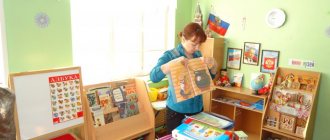Summary of an ethical conversation with primary school children
Summary of the ethical conversation “Polite communication” with primary school children
Author: Valentina Petrovna Churepkina, teacher at the Regional Children's Sanatorium for Tuberculosis Patients, Berezovsky, Barzas, Kemerovo Region.
Conversation "What is politeness." Abstract
Words: “Goodbye!”, “Thank you”, “Sorry”, “Please”, “Hello” - Give generously! Give to passers-by, friends and acquaintances. On the trolleybus, in the park, at school and at home. These words are very, very important. A person needs them like air. It is impossible to live in the world without them. These words must be given with a smile.
Politeness is the first and most pleasant virtue.
One of the aspects of a person’s general culture is a culture of behavior, an integral part of which is politeness. A frank and friendly person knows how to make everyone around him feel comfortable and comfortable. Description: This material will be useful for educators and primary school teachers when conducting conversations with children on moral and ethical topics. Goal: - formation of moral and ethical standards in children, nurturing the desire to be polite. Objectives: - find out students’ views on this issue; - help children understand the meaning of politeness in people’s lives through learning poems, dramatizations, and reading literary texts; - contribute to the education of moral qualities, identifying correct and erroneous ideas about politeness; — to cultivate kindness and mercy towards people, to show by example the magnificent power of politeness. Preliminary work: learning dramatizations: memorizing poetry. Material: hats and costume elements of a fox, bear, crow for staging;
ball. Progress:
Politeness is important for adults and children. Politeness is a wonderful and kind country. Everyone should learn politeness from childhood. Politeness, guys, is a piece of magic. 1. Pupils of one school, when asked “What is politeness?” They answered: “Politeness is... - good manners; - good behavior; — rules of human behavior; - when a person is polite, he is treated well; - a polite person speaks kind words. Do you consider yourself polite? Answer the questions with “yes” or “no.” 1) Do you know how to thank your parents (seller, librarian, friend, etc.) for a request fulfilled, a service rendered, a gift given, etc.? 2) Do you call those you greet by name? 3) Do you always give up your seat to older people on a bus, tram, or trolleybus? 4) Do you let the younger ones go first when entering the school or the cafeteria? 5) Do you fulfill the requests of your elders?
2. Reading poems “Polite words”
1 If you step on your foot, even by accident, even just a little, immediately say: “Sorry.” Or better yet, “Sorry.”
2 If your grandmother gave you a pie in the morning, take it and say “Thank you” - your grandmother will be happy! 3 Everyone will say goodbye, leaving, “Goodbye” to everyone. It’s time for a friend to leave - We’ll tell him “Bye.” 4 To ask for something, you need to be polite. We will add “please” - Everyone will be happy with us. 5 Meeting, new conversation We will start with “Hello.” A friend suddenly came for lunch - We’ll say “Hello” to him. 6 “Good evening”, “Good afternoon” It’s not too lazy for us all to say! “Good morning” we will say to mom when we wake up in the morning. 7 If you break a friend’s or suddenly girlfriend’s toy, you tell them “Sorry” and offer them yours. 8 Suddenly someone treats you to candy or gives you something, say “Thank you” for it, so that you can be polite. 9 “Welcome” to guests, They say both here and there. The guests are leaving home, “Bon voyage!” we wish. Question: Now ask yourself again: are you polite? Task: Let's check how polite you are in the game “Polite Words”.
Game "Polite words".
The teacher throws the ball to the child, the child says a polite word. Guys, I made sure that you know a lot of kind, polite words. Give them more often to your loved ones, family, and friends! 3. The fairy tale “Valuable Parcel” tells how Crow read the book “Lessons in Politeness” and “decided to become polite herself.
We offer a dramatization of an excerpt from the fairy tale “The Valuable Parcel”
The crow headed towards the bears.
He comes up to them and says: - Bon appetit! “Thank you,” the Bear replies. – Take a seat with us. - I would love to, but I don’t have time, I’m in a hurry. - Then take it to the track! - Bear treats Crow. - Thank you! The Crow flew up onto the tree and was about to have lunch, when suddenly she heard: “Golu-um, how pretty!” The Crow looked down and saw: the Fox was standing under the tree. - Who doesn’t know this fable now? - Crow shouts to her from above. - And if you want cheese, ask politely! - Please... be kind! – the Fox spoke in a sweet voice. - This is another matter! – Crow praised and shared the cheese with the Fox. V. Kapninsky Question: Name the polite words that helped the Crow and the Fox get what they asked for.
4. Evaluate the speech behavior of some guys from the point of view of politeness.
1) You are walking with a friend down the street. He greeted a person you didn't know. Should I say hello to you? 2) Teachers are talking in the school corridor. Among them, Oleg saw his class teacher and, passing by, said hello: “Hello, Yuri Vasilyevich!” What would you do? What would you say? 3) You entered the bus from the back platform and saw that your friends were standing at the front door. Should I say hello to them? If necessary, how will you do it? 5. We recognize a person who wants to contact us, not only by words, but also by gestures, by the expression of his face. A smile is especially highly valued in communication. The writer V. Soloukhin spoke about this very well. But people also have a smile at their disposal. Look, almost everything in a person is intended for himself: legs - to walk; mouth - absorb food; eyes - look - you need everything for yourself, except a smile. You don't need a smile for yourself. If it weren't for the mirrors, you would never even see her. A smile is intended for other people to make them feel good, happy and at ease with you. It’s terrible if no one has smiled at you in ten days, and you haven’t smiled at anyone. The soul freezes and turns to stone. Assignment: Continue the list of situations in which it is especially important to smile at your interlocutor: “Greeting”, “You are visiting”, “You have guests”...
6. Offer to listen to V. Bokov’s poem “A Kind Word”.
Child: - And you are gray-haired! - they told me at the meeting. - And they were black! “It was,” I answered. And something immediately fell on my shoulders. And crushed by the stone of existence. - You’re not old! – My friends once told me at the festive table. And it was as if my wings had been untied. And the air whistled tightly under the wing. And I flew into the cloudy heights, And I was enchanted by beauty. The thoughts that had been dormant in me until then were disturbed by the thick fields. - My friends, instill faith in people and say more often: “Good afternoon!” And follow a good example - Extend the lives of people with kind words. Questions: Why did the hero of the poem’s mood deteriorate?
What words untied his wings? Summary of the conversation:
In the everyday life of a polite, well-mannered person there should always be words that we call “magic”. With these words you can open any doors and help restore a good mood. Do good, learn to do good deeds!
We recommend watching:
Poem about etiquette for younger schoolchildren Class hour in elementary school. Rules of ethics Summary of extracurricular activities in elementary school. Rules of behavior in the theater Lesson on extracurricular activities in 4th grade with presentation. Ethics
Similar articles:
Class hour in 3rd grade. Communication culture
Conversation about goodwill and indifference for elementary school students
A conversation about friendship and camaraderie for elementary school students
Conversation for primary schoolchildren on the topic: Etiquette. Abstract
Etiquette for junior schoolchildren. Extracurricular activity






